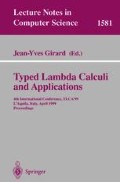Abstract
We develop a notion of Kripke-like parameterized logical predicates for two fragments of intuitionistic linear logic (MILL and DILL) in terms of their category-theoretic models. Such logical predicates are derived from the categorical glueing construction combined with the free symmetric monoidal cocompletion. As applications, we obtain full completeness results of translations between linear type theories.
Access this chapter
Tax calculation will be finalised at checkout
Purchases are for personal use only
Preview
Unable to display preview. Download preview PDF.
References
Abramsky, S., Gay, S.J., and Nagarajan, R. (1996), Specification structures and propositions-as-types for concurrency, in “Proceedings, 8th Banff Higher Order Workshop”, Springer LNCS 1043, pp. 5–40.
Alimohamed, M. (1995), A characterization of lambda definability in categorical models of implicit polymorphism, Theoret. Comp. Sci. 146, 5–23.
Ambler, S.J. (1992), “First Order Linear Logic in Symmetric Monoidal Closed Categories”, Ph.D. thesis, ECS-LFCS-92-194, University of Edinburgh.
Barber, A., Gardner, P., Hasegawa, M., and Plotkin, G. (1998), From action calculi to linear logic, in “Computer Science Logic (CSL’97), Selected Papers”, Springer LNCS 1414, pp. 78–97.
Barber, A., and Plotkin, G. (1997), Dual intuitionistic linear logic, submitted.
Benton, N. (1995), A mixed linear non-linear logic: proofs, terms and models, in “Computer Science Logic (CSL’94), Selected Papers”, Springer LNCS 933, pp. 121–135.
Benton, N., Bierman, G.M., de Paiva, V., and Hyland, J.M.E. (1993), Linear lambda-calculus and categorical models revisited, in “Computer Science Logic (CSL’92), Selected Papers”, Springer LNCS 702, pp. 61–84.
Bierman, G.M. (1995), What is a categorical model of intuitionistic linear logic? in “Proceedings, Typed Lambda Calculi and Applications (TLCA’95)”, Springer LNCS 902, pp. 78–93.
Blute, R.F., Scott, P.J. (1996), Linear Läuchli semantics, Ann. Pure Appl. Logic 77, 229–296.
Eilenberg, S., and Kelly, G.M. (1966), Closed categories, in “Proceedings, Categorical Algebra (La Jolla 1965)”, pp. 421–562, Springer-Verlag.
Garrigue, J., and Minamide, Y. (1998), On the runtime complexity of type-directed unboxing, in “Proceedings, International Conference on Functional Programming (ICFP’98)”, pp. 1–12, ACM Press.
Girard, J.-Y. (1987), Linear logic, Theoret. Comp. Sci. 50, 1–102.
Hasegawa, M. (1999), Categorical glueing and logical predicates for models of linear logic, technical report, RIMS, Kyoto University.
Hermida, C. (1994), “Fibrations, Logical Predicates and Indeterminates”, Ph.D. thesis, ECS-LFCS-93-277, University of Edinburgh.
Im, G.B., and Kelly, G.M. (1986), A universal property of the convolution monoidal structure, J. Pure Appl. Algebra 43, 75–88.
Lafont, Y. (1988), “Logiques, Catégories et Machines”, Thèse de Doctorat, Université Paris VII.
Lambek, J. (1995), Bilinear logic in algebra and linguistics, in “Advances in Linear Logic”, pp. 43–59, Cambridge University Press.
Loader, R. (1994), “Models of Lambda Calculi and Linear Logic: Structural, Equational and Proof-Theoretic Characterisations”, Ph.D. thesis, Oxford University.
Mac Lane, S. (1971), “Categories for theWorking Mathematician”, Graduate Texts in Mathematics 5, Springer-Verlag.
Milner, R. (1996), Calculi for interaction, Acta Inform. 33(8), 707–737.
Mitchell, J.C., and Scedrov, A. (1992), Notes on sconing and relators, in “Computer Science Logic (CSL’92), Selected Papers”, Springer LNCS 702, pp. 352–378.
Power, A.J. (1996), Elementary control structures, in “Proceedings, Concurrency Theory (CONCUR’96)”, Springer LNCS 1119, pp. 115–130.
Tan, A.M. (1997), “Full Completeness for Models of Linear Logic”, Ph.D. thesis, University of Cambridge.
Author information
Authors and Affiliations
Editor information
Editors and Affiliations
Rights and permissions
Copyright information
© 1999 Springer-Verlag Berlin Heidelberg
About this paper
Cite this paper
Hasegawa, M. (1999). Logical Predicates for Intuitionistic Linear Type Theories. In: Girard, JY. (eds) Typed Lambda Calculi and Applications. TLCA 1999. Lecture Notes in Computer Science, vol 1581. Springer, Berlin, Heidelberg. https://doi.org/10.1007/3-540-48959-2_15
Download citation
DOI: https://doi.org/10.1007/3-540-48959-2_15
Published:
Publisher Name: Springer, Berlin, Heidelberg
Print ISBN: 978-3-540-65763-7
Online ISBN: 978-3-540-48959-7
eBook Packages: Springer Book Archive

